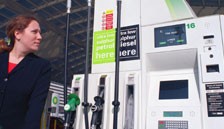One in two drivers (51%) say that rising fuel prices is the biggest challenge in the next 12 months, according to Close Brothers Motor Finance.
Also ranking highly: car insurance hikes (34%), the cost of purchasing a new car (22%), and road tax hikes (19%).
The research of 2,000 drivers also found that one in ten (11%) are having to ask people to contribute towards the cost of petrol when giving them a lift. And more than a quarter (27%) have had to cut back on how often they drive their car.
Lisa Watson, director of sales at Close Brothers Motor Finance, said: “The ongoing hike at the pumps will add further pressure to drivers who already feel they’re faced with increased costs from all lanes.
“Consumers all over the country are looking at ways to tackle the ongoing cost-of-living crisis. With high interest rates, inflation and the increasing prices at petrol pumps – many are now having to explore other measures to stretch their finances further – including charging loved ones for fuel when giving them a lift.”
Responding to the ongoing surge in pump prices, Gordon Balmer, executive director of the Petrol Retailers Association (PRA) said the prices of petrol and diesel have continued to rise throughout September, driven by Saudi Arabia’s decision to extend its crude oil production cut until the end of the year and the weakening of sterling against the US dollar.
The PRA represents independent fuel retailers, which accounts for 64% of all forecourts, many of which are small family run businesses.
Petrol prices have risen for the fourth month in a row, jumping by 4.5p a litre on average last month, according to motoring organisation RAC.
Unleaded increased from about £1.52 to £1.57 in September, increasing the cost of filling a family car to over £86.
The RAC said increased fuel costs were being driven by higher global oil prices, but it also claimed that petrol was being "overpriced".
In response, Balmer said that contrary to claims made by the RAC, PRA members are not pricing petrol higher than needed.
“Fuel margins have been under pressure due to increased operational costs that our members have had to bear. To address rising labour expenses, energy costs, and the highest inflation rates in recent years and reduced fuel sales, margins have inevitably increased. Attempting to whip up public anger by suggesting otherwise is deeply irresponsible.”
















Login to comment
Comments
No comments have been made yet.